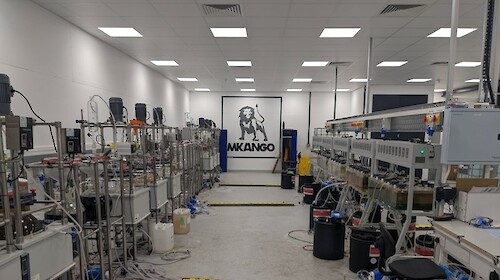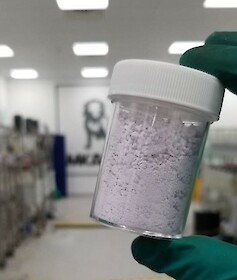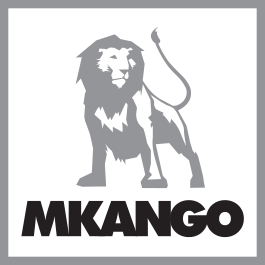Rare earth recycling
HyProMag - Short Loop Magnet-to-Magnet Rare Earth Recycling
HyProMag was founded in 2018 by the late Professor Emeritus Rex Harris, former Head of The Magnetic Materials Group ("MMG") within the School of Metallurgy and Materials at the University of Birmingham; Professor Allan Walton, current Head of the MMG; and two Honorary Fellows, Dr John Speight and Mr David Kennedy, leading world experts in the field of rare earth magnetic materials, alloys and hydrogen technology, with significant industry experience.
Following a transaction completed in August 2023, HyProMag is 100% owned by Maginito Limited, a 90% owned subsidiary of UK and Canada listed, Mkango Resources Ltd (TSXV/AIM:MKA). The core technology being commercialised by HyProMag is the highly energy efficient, patented Hydrogen Processing of Magnet Scrap ("HPMS") technology to extract and demagnetise NdFeB (neodymium iron boron) alloy powders from magnets embedded in scrap and redundant equipment.
Our aim is to develop a full recycling supply chain for rare earth magnets based upon neodymium iron boron (NdFeB). HyProMag has licensed the patented HPMS technology developed in the Magnetic Materials Group (MMG) at the University of Birmingham. This patent and related Intellectual Property is at the core of HyProMag. HPMS is a hydrogen-based process which is used to extract NdFeB magnets from electrical products such as hard disk drives. The extracted NdFeB powder is in the form of an alloy which can be re-processed into different forms which can be sold back into the supply chain or utilised directly in the manufacture of new NdFeB magnets, of a variety of commercial grades.
HyProMag USA – Feasibility Study Results (2024)
In November 2024, HyProMag USA announced the results of the Feasibility Study. Sintered NdFeB magnets will be produced in the United States using materials sourced in the United States, contributing to security of NdFeB permanent magnet supply and enabling economical, traceable, domestic U.S. production of recycled NdFeB magnets (DFARS compliant) supporting the defence, aerospace, automotive, medical science, hyperscale data centres, robotics, and energy transition industries.
Highlights
- Positive Feasibility Study results for state-of-the art rare earth magnet recycling and manufacturing operation in the United States (the "Project"), with a central Dallas Fort Worth ("DFW"), Texas hub supported by two pre-processing spoke sites in the eastern and western regions of the United States:
- US$262 million post-tax Net Present Value (NPV) and 23% real internal rate of return (IRR) based on current market prices
- US$503 million post-tax NPV2 and 31% real IRR based on forecast market Prices
- Low all-in sustaining Cost (AISC) of US$19.6 per kg of NdFeB product which compares to current weighted average market prices of US$55 per kg of NdFeB products, the latter reflects underlying prevailing low rare earth prices with significant scope for price recovery
- Expansion potential with the inclusion of a third HPMS vessel within three years following commissioning for an additional capital cost of approximately US$7 million
- Production of 750 metric tons per annum of recycled sintered NdFeB magnets and 291 metric tons per annum of associated NdFeB co-products (total payable capacity - 1,041 metric tons NdFeB) over a 40 year operating life
- Up-front capital cost of the Project is US$125 million (inclusive of a 10% contingency margin and Class 3 AACE estimated detailed design study and engineering costs) over a 1.7 year construction phase
- Payback is achieved at current market prices in 3.9 years at a profitability index ("PI") of 2.1, at forecast market prices payback is achieved in 3.1 years at a PI of 4.0
- First Revenue targeted in Q1 2027 with a Notice to Proceed ("NTP") expected in mid-2025 following completion of Detailed Engineering Design and Value Engineering phase, which will commence shortly and include:
- Evaluation of significant opportunities to optimize construction and operational efficiency, and to reduce capital expenditure and operating costs, as well as to expand production
- Parallel product and operational testing in the UK at the University of Birmingham Magnetic Materials Group ("MMG") pilot plant and in conjunction with HyProMag commercial developments in UK and Germany
- Completion of commercial arrangements with potential feed supply and product off taker - discussions with several potential parties underway
- Continued discussions with federal, state and municipal governments, in relation to financing opportunities and other economic incentives including carbon price premiums which could improve economics
- Project will help secure the re-vitalization of NdFeB magnet production in the United States with the creation of approximately 90 jobs across Texas, South Carolina and Nevada
- Minviro Limited has been commissioned to complete an ISO-14067 compliant "Product Carbon Footprint" analysis of sintered materials by the end of Q4 2024 using the results of the Feasibility Study
- HyProMag USA is targeting 10% of U.S domestic demand for NdFeB magnets within five years of commissioning - design is modular, can be replicated and accelerated to facilities in eastern and western United States
- The Feasibility Study was undertaken by a multidisciplinary team appointed by CoTec and Mkango and led by independent engineers, Canada-based BBA USA Inc. ("BBA") and U.S. based PegasusTSI Inc. ("PegasusTSI") with other independent experts and support from University of Birmingham, HyProMag Ltd and HyProMag GmbH.
HyProMag Ltd and HyProMag GmbH
HPMS is a key enabler for recycling of rare earth magnets in electronics, electric vehicles, robotics, wind turbines and other applications, with major competitive advantages in the rare earth magnet recycling sector, underpinned by approximately US$100m of R&D expenditure at the University of Birmingham and with associated project partners. This is coupled with the ability to manufacture rare earth alloys and magnets with significantly reduced carbon footprint. HyProMag is establishing short loop recycling facilities for NdFeB magnets at Tyseley Energy Park in Birmingham, UK and other locations using the patented HPMS process to provide a sustainable solution for the supply of NdFeB magnets and alloys for a wide range of markets including, for example, automotive and electronics. Short loop magnet recycling is expected to have a significant environmental benefit, requiring an estimated 88% less energy versus primary mining to separation to metal alloy to magnet production. The plant at Tyseley Energy Park is being developed together with the University of Birmingham, with a minimum capacity of 100tpa NdFeB. This £4.3 million project is being funded by Driving the Electric Revolution, an Industrial Strategy Challenge Fund challenge delivered by UK Research and Innovation ("UKRI"). The focus of the project is to take the HPMS technology to a greater scale and efficiency with revolutionary new design of processing equipment and extensive automation of processing methods for inert atmosphere powder handling and pressing.
HyProMag Ltd is the primary industrial user and operator of the plant. First production is targeted for end of Q1 2025, which follows successful piloting at the University of Birmingham in 2022. Commissioning of scaled-up rare earth magnet recycling and manufacturing plant, is progressing in parallel with piloting at University of Birmingham.
In November 2021, HyProMag established an 80%-owned subsidiary in Germany, HyProMag GmbH, to roll out commercialisation of HPMS technology into Germany and Europe. HyProMag GmbH is 20% owned (10% following conversion of the HyProMag GmbH convertible loan) by Professor Carlo Burkhardt of Pforzheim University, co-ordinator of the €14m SusMagPro and €13m REEsilience EU funded recycling projects, with approximately 40 partners across the European supply chain. HyProMag GmbH is developing a similar sized plant in Baden-Württemberg to that at Tyseley Energy Park. Initial capacity is expected to be a minimum of 100tpa NdFeB, comprising recycled rare earth sintered magnets and alloys and will be the first in Germany using the patented HPMS process, with first production targeted for 2025.
Recent milestones include:
UK
- Magnet presses commissioned, and powder processing plant has been constructed, with preparation for infrastructure development underway.
- Hydrogen Processing of Magnet Scrap (HPMS) vessel targeted for factory acceptance test (FAT) and available for delivery end of February 2025.
- Completion of infrastructure developments and first production from Tyseley targeted by the end of April 2025, with ongoing pilot production enabling delivery of products to customers in advance of this.
Germany
- Development of the scaled-up rare earth magnet recycling and manufacturing plant in Germany is progressing on track for 2025 production.
- A site has been selected near Pforzheim, Germany and lease signed, with planning for the infrastructure development progressing well.
- Equipment ordered to date includes HPMS vessel, magnet presses, jet mill, sintering furnaces and other items.
In October 2023, HyProMag's HPMS technology was identified as one of only 17 key global projects by the Minerals Security Partnership (MSP), a collaboration of 14 countries and the EU, aiming to catalyse public and private investment in responsible critical minerals supply chains globally.
In January 2024, CoTec and Maginito Limited announced the formation of a 50/50 joint venture entity which will roll out HyProMag's HPMS recycling technology into the United States. The JV company, named HyProMag USA LLC, is developing a low cost, low carbon, sustainable rare earth magnet recycling and production business underpinned by HPMS. HyProMag Ltd has sublicensed the HPMS technology to HyProMag USA.
The results of HyProMag USA’s bankable feasibility study were announced to the market in November 2024, based on a hub and spoke model using three HPMS vessels and one magnet manufacturing hub which will be based in Texas. The Feasibility Study includes the completion of detailed engineering designs, as well as permitting and potential site acquisition. Environment and permitting studies will be supported by US based Weston Solutions, Inc. First Revenue targeted in Q1 2027 with a Notice to Proceed expected in mid-2025 following completion of detailed engineering, which will commence shortly,
Following completion of the Feasibility Study, CoTec and Mkango will make a joint decision as to whether HyProMag USA will proceed with the construction of the US Project. CoTec is responsible for funding the Feasibility Study and the project development costs. Funding provided by CoTec would be in the form of shareholder loans to HyProMag USA.
Mkango Rare Earths UK – Long-loop Rare Earth Magnet to Oxide Recycling
In June 2024, Mkango Rare Earths UK ("Mkango UK") has successfully commissioned a pilot plant at Tyseley Energy Park, Birmingham, designed to produce separated magnet rare earths (neodymium/praseodymium and dysprosium/terbium carbonates or oxides) via a long-loop recycling process. Mkango UK is 100% owned by Maginito Limited ("Maginito"), which is 79.4% owned by Mkango and 20.6% owned by CoTec Holdings ("CoTec").
The long-loop pilot plant received 70% of its funding from the UKRI's Driving Electric Revolution Challenge, delivered by Innovate UK, as part of the grant-funded project "Secure Critical Rare Earth Magnets for the UK" (SCREAM). Project partners include HyProMag, Bowers & Wilkins, European Metal Recycling (EMR), GKN Automotive, Jaguar Land Rover, and the University of Birmingham.
Both long-loop and short-loop recycling technologies are underpinned by the patented HPMS technology developed at University of Birmingham, which liberates magnets from end-of-life scrap streams in a cost effective and energy efficient way to produce a recycled NdFeB alloy powder, which is manufactured into a magnet (via the short loop process) or into a rare earth carbonate or oxide (via the long-loop chemical process).
Optimisation of long-loop pilot operations is underway, targeting near-term pilot scale production of the first 50kg batch of rare earth carbonates and oxides, in parallel with completion of scoping studies and evaluation of options to advance long loop recycling via stand-alone development, joint venture or other commercial arrangements. The long-loop recycling route is used to process NdFeB HPMS powder not suitable for short-loop recycling and for the processing of magnet swarf (i.e. the powder produced from grinding and finishing magnets).
 |
 |

